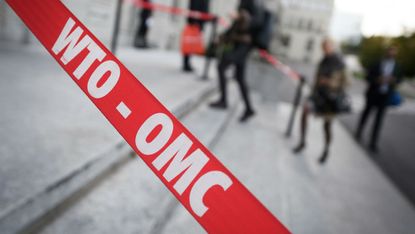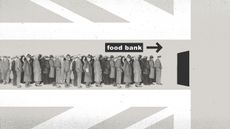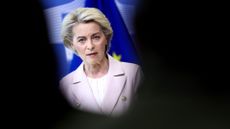WTO to suffer heavy blow as US hinders appeals court
Final forum for global trade disputes to shut after US blocks appointment of new judges

The World Trade Organization (WTO) is set to lose its system for resolving disputes between members, with huge implications for global trade and how deals are mediated in the future.
Described by former director general Pascal Lammy as the WTO’s “crown jewels”, the Appellate Body has been likened to a Supreme Court for global trade.
Yet despite its role as the final appeals forum for international disputes, it is set to close its doors tomorrow after the United States blocked the appointment of two new judges to sit on its seven-person panel.
Subscribe to The Week
Escape your echo chamber. Get the facts behind the news, plus analysis from multiple perspectives.

Sign up for The Week's Free Newsletters
From our morning news briefing to a weekly Good News Newsletter, get the best of The Week delivered directly to your inbox.
From our morning news briefing to a weekly Good News Newsletter, get the best of The Week delivered directly to your inbox.
“Perhaps the biggest issue is that the US accuses the WTO dispute system of ‘judicial overreach’ - essentially that it interprets the WTO rules in a way that creates new obligations for WTO members”, reports the BBC.
One area that particularly grates in Washington is dumping, when a foreign supplier sells goods abroad more cheaply than at home. The US has even threatened to close down the WTO altogether by blocking its budget, although it has rowed back from that threat.
At a time when US president Donald Trump is in a damaging trade battle with China, and after Trump just days ago threatened France with 100% wine tariffs in retaliation for President Macron’s new digital tax, “the 164-member body is losing its ultimate referee on international trade at the worst possible time”, says the Daily Telegraph.
The Guardian reports that “unless Donald Trump backs off at the last minute and agrees to a peace plan, Washington’s protracted battle to safeguard US sovereignty will lead to the neutering of the WTO’s ability to police global trade”.
–––––––––––––––––––––––––––––––For a round-up of the most important business stories and tips for the week’s best shares - try The Week magazine. Start your trial subscription today –––––––––––––––––––––––––––––––
This would plunge the Geneva-based organisation “into the biggest crisis in its 25-year history”, says the paper, leading to “a backlog of unresolved disputes and mak[ing] it easier for countries to break WTO trade rules without facing penalties”.
“Moreover, this could have uncomfortable implications for the UK, particularly if it leaves the EU without a trade deal at the end of 2020, as promised by the Conservative Party’s election manifesto”, says the Telegraph.
The newspaper adds that “if the UK were to take a dispute with the EU to the WTO, it has no recourse to appeal an unfavourable panel decision”.
“The UK is choosing a particularly difficult time to extricate itself from its regional trading bloc and try to seek out its own path in this global trading system, which is fraying at the edges”, says Sam Lowe, a trade expert at the Centre for European Reform.
Marianne Schneider-Petsinger, an international trade expert and fellow at Chatham House, was more blunt. “In an environment where the WTO dispute settlement system isn’t fully functioning, it's going to be much more difficult and uncertain to enforce the UK’s rights”, said Schneider-Petsinger.
“Is it really wise for the UK to use the WTO as its key platform in a world where the WTO is under threat?”
Create an account with the same email registered to your subscription to unlock access.
Sign up for Today's Best Articles in your inbox
A free daily email with the biggest news stories of the day – and the best features from TheWeek.com
-
 'Make legal immigration a more plausible option'
'Make legal immigration a more plausible option'Instant Opinion Opinion, comment and editorials of the day
By Harold Maass, The Week US Published
-
 LA-to-Las Vegas high-speed rail line breaks ground
LA-to-Las Vegas high-speed rail line breaks groundSpeed Read The railway will be ready as soon as 2028
By Peter Weber, The Week US Published
-
 Israel's military intelligence chief resigns
Israel's military intelligence chief resignsSpeed Read Maj. Gen. Aharon Haliva is the first leader to quit for failing to prevent the Hamas attack in October
By Justin Klawans, The Week US Published
-
 Why au pairs might become a thing of the past
Why au pairs might become a thing of the pastUnder The Radar Brexit and wage ruling are threatening the 'mutually beneficial arrangement'
By Chas Newkey-Burden, The Week UK Published
-
 Brexit: where we are four years on
Brexit: where we are four years onThe Explainer Questions around immigration, trade and Northern Ireland remain as 'divisive as ever'
By The Week UK Published
-
 Is it time for Britons to accept they are poorer?
Is it time for Britons to accept they are poorer?Today's Big Question Remark from Bank of England’s Huw Pill condemned as ‘tin-eared’
By Chas Newkey-Burden Published
-
 Is Brexit to blame for the current financial crisis?
Is Brexit to blame for the current financial crisis?Talking Point Some economists say leaving the EU is behind Britain’s worsening finances but others question the data
By The Week Staff Published
-
 Labour shortages: the ‘most urgent problem’ facing the UK economy right now
Labour shortages: the ‘most urgent problem’ facing the UK economy right nowSpeed Read Britain is currently in the grip of an ‘employment crisis’
By The Week Staff Published
-
 Will the energy war hurt Europe more than Russia?
Will the energy war hurt Europe more than Russia?Speed Read European Commission proposes a total ban on Russian oil
By The Week Staff Published
-
 Will Elon Musk manage to take over Twitter?
Will Elon Musk manage to take over Twitter?Speed Read The world’s richest man has launched a hostile takeover bid worth $43bn
By The Week Staff Last updated
-
 Shoppers urged not to buy into dodgy Black Friday deals
Shoppers urged not to buy into dodgy Black Friday dealsSpeed Read Consumer watchdog says better prices can be had on most of the so-called bargain offers
By The Week Staff Published